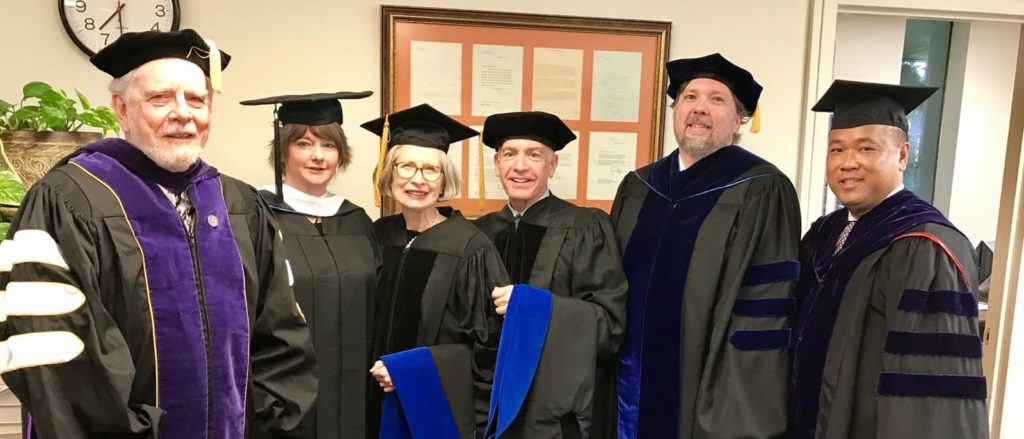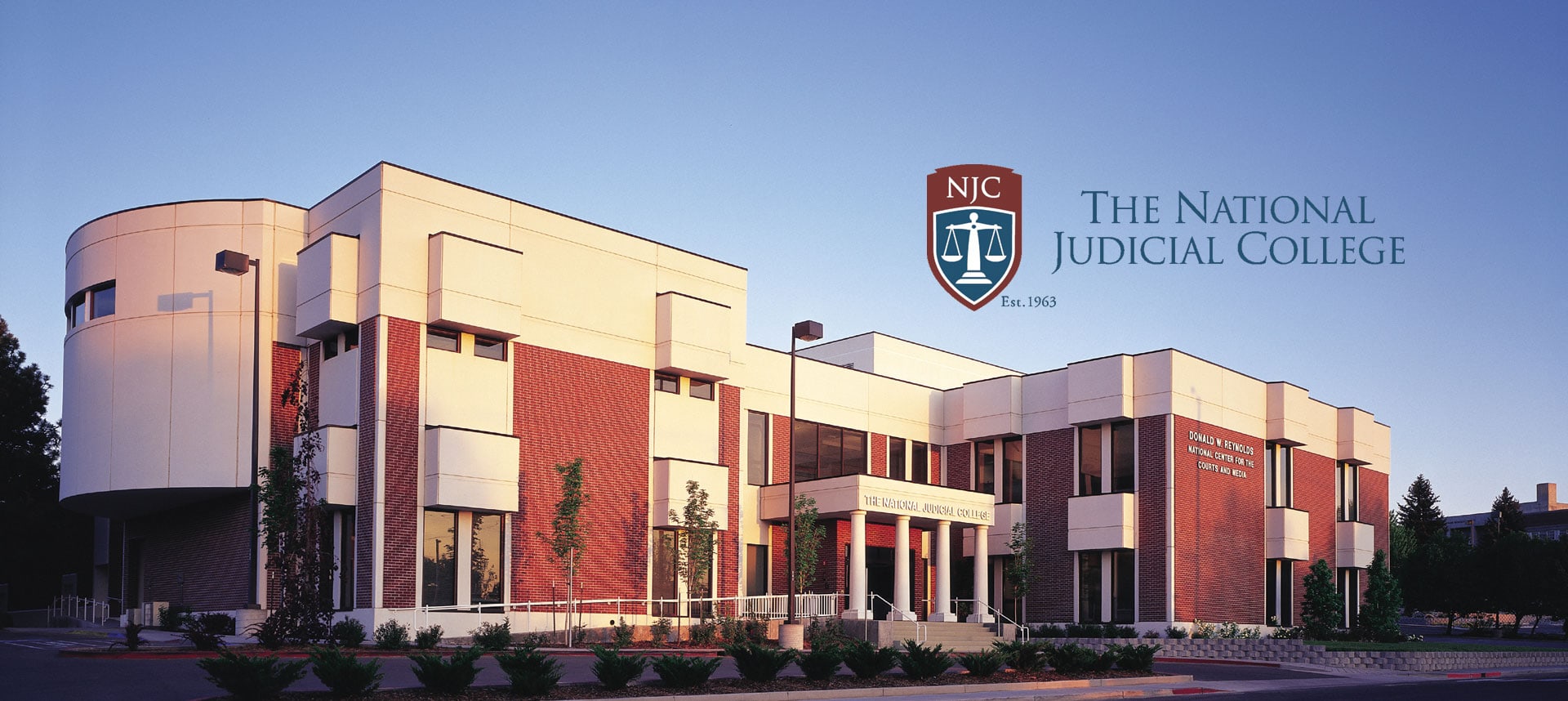

From left: former Judicial Studies Director Dr. James T. Richardson, judges Kimberly Carlton Bonner, Reba Ann Page and David Allen Anderson, Director of Judicial Studies Dr. Shawn Marsh and NJC President Benes Aldana
In many professions, earning an advanced degree can guarantee a larger salary or promotion. That’s not the case for judges. A master’s or Ph.D. doesn’t magically grant a promotion to a higher court or a raise in pay.
It’s not surprising, therefore, that judges pursuing advanced degrees often say they do so not for financial reasons but out of a thirst for knowledge and the satisfaction of accomplishing something difficult.
Five judges who exemplify that attitude recently earned judicial studies degrees from the University of Nevada, Reno. The judicial studies program is a cooperative venture of the university, the NJC, and the National Council of Juvenile and Family Court Judges.
Receiving a doctorate in judicial studies were military judges David Allen Anderson and Reba Ann Page.
Kimberly Carlton Bonner, Mary Helen Maley and John H. Schumacher each earned a master’s in judicial studies.
Five graduates in one year was a large number for the program. Typically one or two judges receive degrees.
Many of the five worked on their degrees for more than five to 10 years. It involved altering their dockets to take time away from the bench, paying for costs out of pocket, and missing precious time with family.
The judges crossed paths frequently at courses in Reno and collaborated on their theses and dissertation projects, forming friendships and a tight-knit community. They made a pact to walk in graduation together, and three of them were able to do so. Anderson, Page and Bonner each received their diplomas in person on May 21.
“We’ve all formed wonderful friendships and a great community of support together,” said Page. “We’re judges of different jurisdictions from different regions, and we all came together through the process.”
Here’s a look at each of the graduates:
Hon. David Allen Anderson, U.S. Court of Appeals for the Armed Forces
Ph.D. dissertation: “An Empirical Study of the Political Party Balance Requirement of the United States Court of Appeals for the Armed Forces and its Predecessor-Court, the United States Court of Military Appeals, from 1951 to 2016”
Anderson has served as director of the Central Legal Staff and chief deputy clerk at the U.S. Court of Appeals for the Armed Forces in Washington, D.C., since 2002. Previously he served on active duty in the Marine Corps as a judge advocate for 24 years before retiring as a colonel.
Anderson first attended the NJC in 1991. He went on to earn a skills certificate from the NJC, a master’s and now the Ph.D. from the judicial studies program. His dissertation concluded that the political affiliation of a judge on the Court of Appeals for the Armed Forces was not significantly related to judicial decisions.
Hon. Reba Ann Page, U.S. Armed Services Board of Contract Appeals
Ph.D. dissertation: “Wringing Their Bread from the Sweat of Other Men’s Faces: The Persistent Use of Forced Labor in the Postbellum South”
Page is an alumnus and faculty member of the NJC and has served as an administrative law judge for the U.S. Armed Services Board of Contract Appeals since 2000. She’s been in the legal field for 40 years and has been on the bench for more than 20 years.
She first attended the NJC in 2001, joined the faculty the following year, and received her master’s in judicial studies in 2011. Her Ph.D. dissertation examined racism surrounding the 1927 Mississippi River flood, the treatment of black flood victims, and its impact on the civil rights movement.
Hon. Kimberly Carlton Bonner, 12th Circuit Court of Florida
Master’s thesis: “A Historic Acquittal Re-Examined: Would the Earps and Doc Holliday Escape Indictment Under the Modern Grand Jury System?”
Bonner has served the 12th Circuit Court of Florida since 2012. She previously served the Sarasota County Court from 2002–13 and worked as a staff attorney in the U.S. Department of Agriculture.
She started attending NJC courses in 2004 and entered the master’s program in 2013. Bonner’s thesis grew out of her affinity for history, the Old West, and the law. Her thesis examined the gunfight at the O.K. Corral in 1881 and whether the lawmen involved in that shooting, the Earp brothers and Doc Holliday, would avoid indictment if that event took place in modern times.
Hon. Mary Helen Maley (Ret.), Nogales Justice Court
Master’s thesis: “Including the Larger Community in Pretrial Services in Community Supervision: The Circles of Peace Experiment”
Maley served more than 20 years on the Santa Cruz County Justice Court bench in Arizona before retiring in 2014. Her caseload frequently involved domestic violence cases, and she grew frustrated with negative outcomes and ineffective programs to address the issues. She read several books and looked at different methods before discovering the work of Linda G. Mills, a professor of social work, public policy and law at New York University.
Together they founded Circles of Peace, a restorative-justice program rooted in peacemaking techniques. The program originally worked with domestic violence cases but has since expanded to parenting and substance abuse. Maley’s thesis examined the success of pretrial services with Circles of Peace. She first attended courses at the NJC in 1999.
Hon. John H. Schumacher, U.S. Occupational Safety & Health Review Commission
Master’s thesis: “Ripe for Appeal: Who is Considered an ‘Employer’ When Determining Liability for Multi-Employer Worksite Safety Violations?”
Schumacher is an administrative law judge who adjudicates hearings involving alleged job safety and health violations. He’s previously served as a Social Security administrative law judge, a trial attorney with the Bureau of Alcohol, Tobacco and Firearms, and as a judge advocate with the Air Force.
Schumacher first attended NJC courses in 2005. For his thesis, he researched who is considered an employer in multi-employer worksite safety violations, something that isn’t always clear in OSHA cases. Schumacher is one of just 12 OSHA judges in the country, and he said he plans to send a copy of his thesis to each of his counterparts.

The Hon. Mary-Margaret Anderson (Ret.), a retired administrative law judge with the California Office of Ad...

Happy October, Gaveliers faithful. Are you loving this or what? No one believed a team made up of judges...


Hon. Diane J. Humetewa, the first Native American woman and the first enrolled tribal member to serve as a ...

Retired Massachusetts Chief Justice Margaret H. Marshall has been selected as the 2024 winner of the presti...